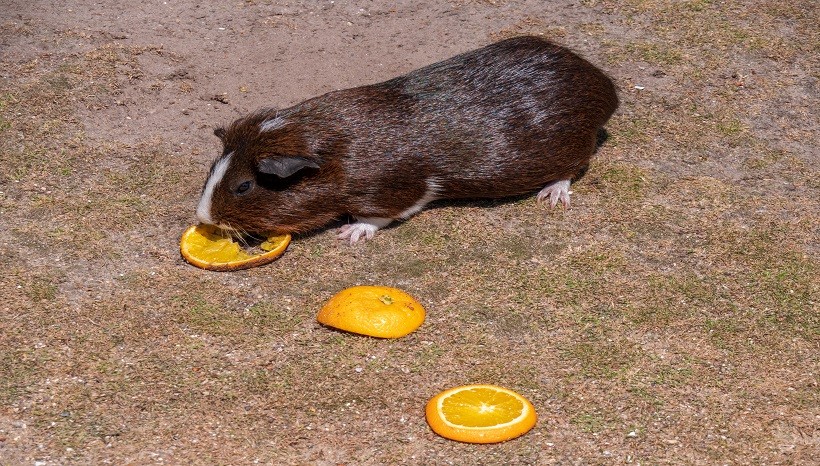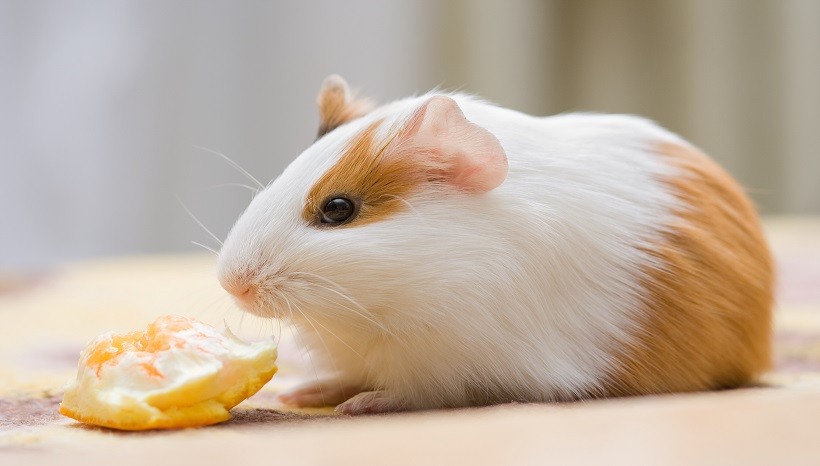Yes, guinea pigs can eat orange peels safely. Fruit peel is one of the most things that pigs can consume. Peels of oranges are completely safe for these animals to eat. Also, peels contain almost as many nutrients as flesh. Guinea pigs get the most vitamin C and ascorbic acid from orange peels. According to research, orange peels are harmless for guinea pigs to ingest.
Can guinea pigs have an orange peel? find out by reading on.
What Are Guinea Pigs?
Guinea pigs, or cavies, are a member of the Caviidae family, which includes several rodent species native to South America. The domesticated guinea pig (Cavia porcellus) is perhaps the most well-known member of this family, and there are 13 distinct types.
Because it has tiny legs, a large head, large eyes (and small ears), it is comparable to other caves in appearance. As adults, they can weigh up to 2.5 pounds and grow up to 10-11 inches in length. They can reproduce all year round in captivity.
Can Guinea Pigs Eat Oranges?

Yes, guinea pigs can eat oranges. Oranges are a great source of calcium and vitamin C, that benefit the health of your pet cavies. You can give them an orange wedge once a week. If we increase the amount, the acidity of the fruit may upset their digestive system. The high sugar content of oranges may potentially pose an issue for them.
Orange seeds should not be fed to guinea pigs as a food source. They have small intestinal tracts and the seeds are hard and slippery to ingest through. Always prefer seedless fruits to avoid any choking hazard.
Nutrition Facts Of Oranges
Oranges have a high concentration of polyphenolic compounds in their skin, which can help protect against a wide range of health problems. Vitamin C and fiber aside, oranges also contain potassium. Oranges have a low protein content as well.
Nutrition Facts Of Orange Peels
Vitamin C, folate, vitamin B6, calcium, and other necessary components are present in orange peels. These are natural antioxidants that strengthen the immune system’s overall health and aid in fighting against illness and infection.
Peels contain limonene, a naturally occurring substance that has anti-cancer potential. This can improve digestion and reduce gastrointestinal disorders such as acidity, heartburn, and fatty meal digestion.
Guinea Pigs Like Orange Peel
Orange peels have a delicious and fruity flavor that guinea pigs love. They like sweet, sour, and juicy fruits and vegetables. Orange peels can be a favorite treat for guinea pigs. If you want them to be happy and healthy, make sure to provide them with a well-balanced diet that contains all of the nutrients they require. Oranges and their peels are not only one of the finest cold-weather fruits, but they are also one of the healthiest.
It is well known that orange peels are not well-liked by most Guinea pigs. This isn’t a tasty treat, either. Their rough texture and harsh taste are partly to blame. Still, they are highly healthful and give a variety of health benefits to your pets.
Can Guinea Pigs Eat Orange Peel Safely?

It is flawlessly reliable for guinea pigs to try orange peels. Ascorbic acid, or vitamin C, is found in abundance in these vitamin-rich fruits, making them excellent for their nutritional needs and consumption.
It is not possible for Guinea pigs to produce vitamin C. Food is the only source of these nutrients. Fresh grass provides vitamin C for wild guinea pigs. Citrus fruits are quite safe for them to eat.
Feeding Tip
Feeding oranges peel a few slices with other vegetables will help reduce the acidic influence on the stomach and the rest of the digestive system of guinea pigs.
Due to a lack of vitamin C in their body, Guinea pigs are prone to a wide range of diseases and disorders, such as scurvy.
Don’t overfeed them with vitamin C-rich orange peels. A few bits of the peel will keep them healthy and happy. Also, the orange peels should be washed thoroughly before serving.
Orange Peels Have Health Benefits For Guinea Pigs
Orange peels are high in protein, carbohydrates, and calories, making them a nutritious snack.
Scurvy is a condition caused by a lack of vitamin C. Consuming the orange peel will provide your Guinea Pigs with extra Vitamin C, which helps them prevent scurvy.
Orange peels contain flavonoids, phytochemicals, and limonene. When these three metabolites are together, they can anticipate the majority of cancers. When your guinea pigs eat orange peels, they will be happier, calmer, and sleep better.
Orange peels are high in vitamin B6, which is responsible for the overall health benefits mentioned above. You can keep your guinea pigs from getting diarrhea by feeding them orange peels in limited amounts.
Furthermore, orange peels are high in fiber and can aid with digestion.
Conclusion
It’s important to examine the pros and cons of giving your guinea pigs oranges and their peels. Contrary to other fruits, guinea pigs may eat orange peels, which are high in vitamin C. Some guinea pigs are obsessed with the flavor of orange peel and would do anything to get their hands on it. According to popular belief, they can eat orange peels in a matter of seconds because they are so tasty. Even though this food has multiple health benefits, it can also be harmful if ingested in the wrong way.
If you want to learn more about pets visit us at petshoods
{ "@context": "https://schema.org", "@type": "Article", "mainEntityOfPage": { "@type": "WebPage", "@id": "https://petshoods.com/can-guinea-pigs-eat-orange-peel/" }, "headline": "Can Guinea Pigs Eat Orange Peel? | Feeding Tips And Benefits", "description": "Yes, Guinea Pigs Can Eat Vitamins Rich Fruit Like Orange, Its Peels And Inside Flesh. Orange Peels Has A Fruity Taste And Sufficient Amount Of Vitamin C.", "image": "https://petshoods.com/wp-content/uploads/2021/08/Can-Guinea-Pigs-Eat-Orange-Peel-768x436.jpg", "author": { "@type": "Person", "name": "Jeremy" }, "publisher": { "@type": "Organization", "name": "Petshoods", "logo": { "@type": "ImageObject", "url": "https://petshoods.com/wp-content/uploads/2019/02/13925402_1502331219793083_1620090286454245017_n.jpg" } }, "datePublished": "2021-09-06", "dateModified": "2021-09-18" }